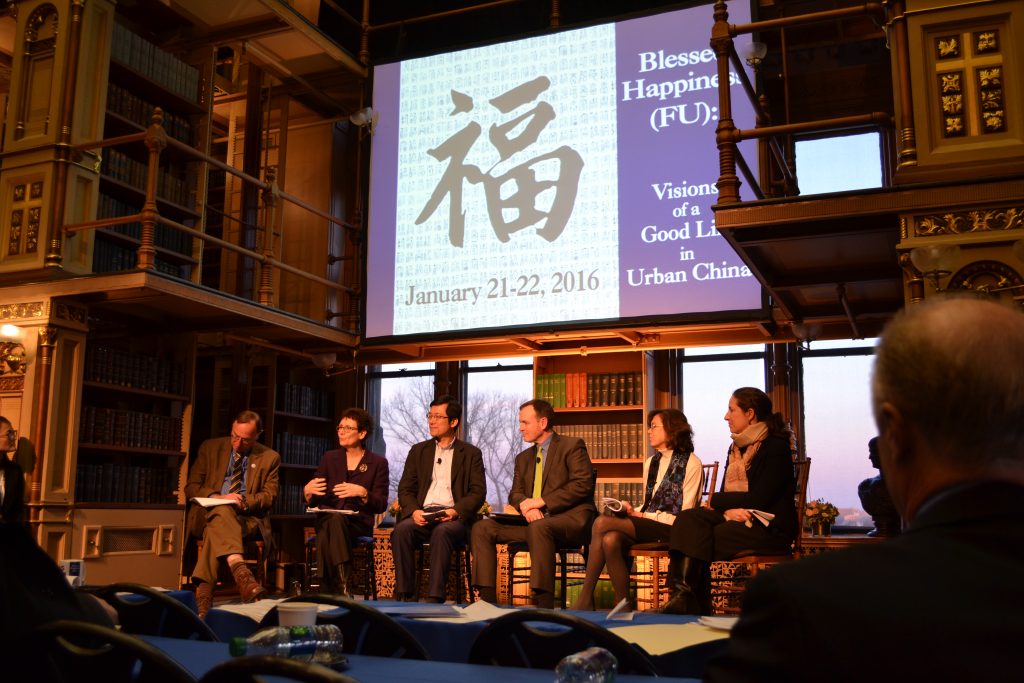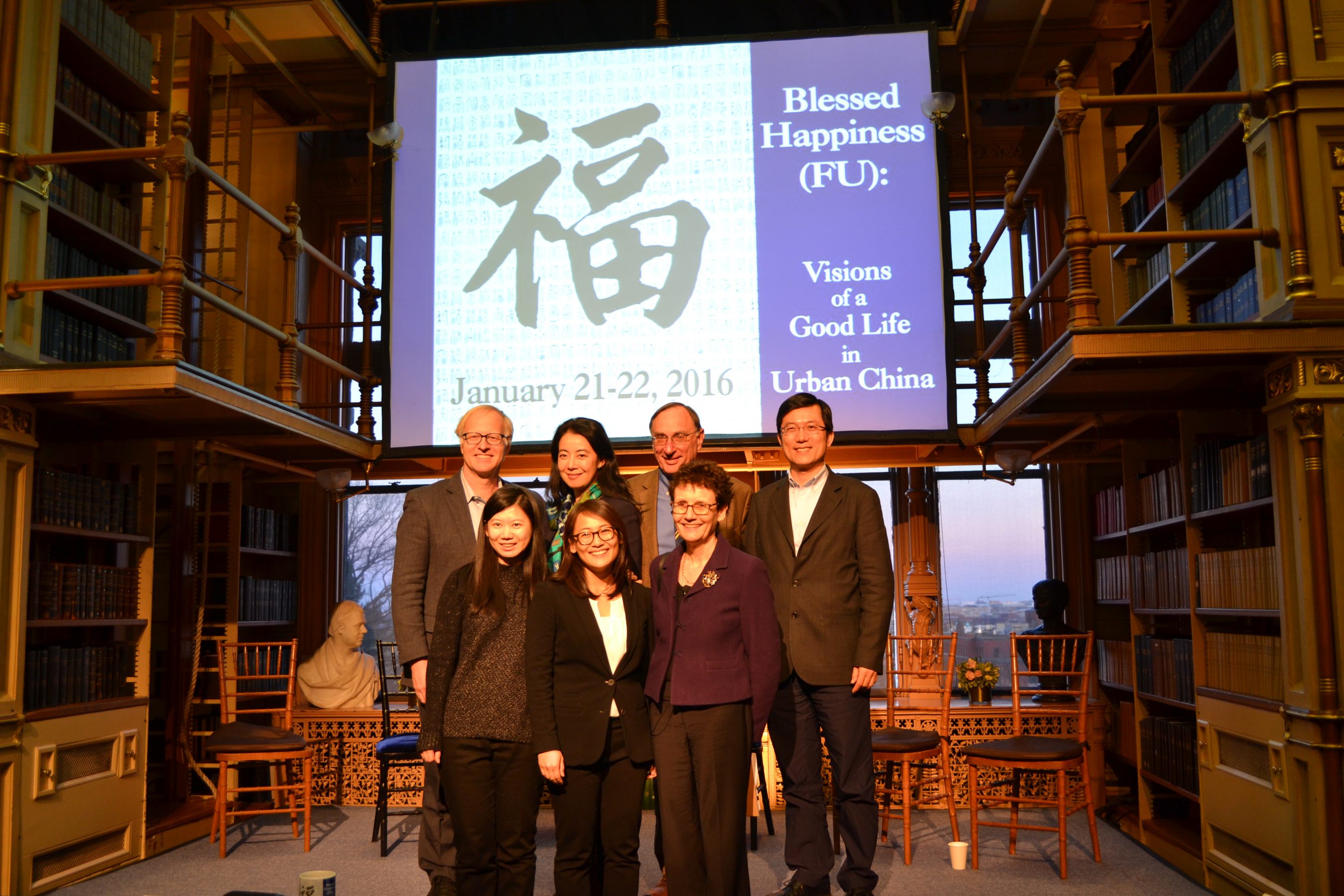On Jan. 21 and 22, Georgetown University’s Department of Sociology hosted the symposium “Blessed Happiness (Fu): Visions of a Good Life in Urban China,” during which researchers presented their findings from an ongoing project of three years on how the Chinese people define happiness.
“We want to know what people are doing to have a good life, and conversely, what makes it hard for them to have a good life,” said Dr. Becky Yang Hsu in her welcoming speech. Hsu is Assistant Professor of Sociology at Georgetown University and Principal Investigator for this new study of happiness.
At a public presentation Thursday, Jan. 21, the members of Hsu’s research team – whose fieldwork is now drawing to a close – shared their preliminary findings from their study, “The Concept of Fu in Contemporary China: Searching for Well-Being, Purpose, and the Good Life.” The presentation took place over the course of the day.
Their reports were followed by discussion panels, which consisted of several leading scholars in Chinese studies, during which the commentators offered their respective knowledge on the issue of happiness in Chinese society.
During the Panel on Public Life, Robert Daly, Director of the Kissinger Institute on China and the United States, listed the three main obstacles to happiness he sees in China. Those are material happiness, limited freedom, and lack of leisure time.

Panel on Public Life: (from left to right) researchers Richard Madsen, Deborah S. Davis, and Chih-Jou Chen and discussants Robert Daly, Carol Graham, and Susan Jakes
“While happiness requires political freedom, in many cases, it also demands freedom of time, leisure, for relationships, for rituals, for eating, for courting, for mourning,” said Daly. “I encourage the group to look at questions of, simply, time and lifestyle. For the exercise of freedom or the pursuit of the good life, no matter how individual Chinese might see it, it seems to be an essential piece of this question.”
Carol Graham, a senior fellow at the Brookings Institution, offered her economic expertise on the issue of Chinese happiness. She addressed the reports on public life by researchers Dr. Richard Madsen, Dr. Deborah S. Davis, and Dr. Chih-Jou Chen. “All of them have a theme, whether the authors knew that before or not, but it’s this tension in terms of defining and measuring happiness in the context of an authoritarian regime, which has established the public’s happiness as an explicit objective,” she said. “Public happiness, which is defined by the government, and individual happiness, as we’ve been measuring it all over the world for a decade now, are very different things.”
“Marriage pressure is an immense source of unhappiness [in China],” said Dr. James Ferrer, a Professor of Sociology and Global Studies at Sophia University in Tokyo and member of the research team.
Hsu also noted that China’s One-child Policy, which the Chinese government has now changed to a two-child policy, created added pressure for the Chinese people, both parents and their only children. She relates this insecurity to the importance of parenting in Chinese culture and the high costs for health care.
Although the Chinese economy has grown rapidly in recent years, Weiwei Zhang, Adjunct Professor of Sociology at Georgetown University, did not equate this to increased happiness among the Chinese people. “While the Chinese are enmeshed in the joy of successful economic growth brought about by the opening-up policy, problems induced by rapid modernization have also emerged,” Zhang wrote in an email to the Voice. “The Chinese have begun to miss the old times when the sky was blue and food was safe, although they lived in a smaller house and didn’t have a luxury car. So, although China is wealthier, it’s hard to say that Chinese people feel happier.”
Hsu’s research team reconvened Jan. 22 in a closed meeting with a group of survey researchers to talk about the implications of their ethnographic work on cross-national surveys of happiness. In attendance were Yanjie Bian, Co-Founder and Co-Principal Investigator of the Chinese General Social Survey, Christian Haerpfer, President of the World Values Survey Association, and Martin King Whyte, John Zwaanstra Professor of International Studies and Sociology Emeritus and Faculty Associate of the Fairbank Center for Chinese Studies at Harvard University. Although this meeting was closed to the public, there is to be a report made available online shortly, according to their website.
“What we’re talking about today is how we could possibly make some of the new things we do in this China survey something for the whole world,” Hsu said.
A Chinese surveying company is currently sampling the survey Hsu’s team developed through face to face interviews in the homes of Chinese citizens. Although their field work focused on Chinese urban life, the survey is covering both urban and rural areas. “It will be a representative survey of the whole country,” Hsu said.
According to Zhang, Hsu’s team formulated this survey from interviews they conducted with Chinese people. The questions are based on what the interviewees indicated as important in their lives.
Regarding the survey, Hsu highlighted her team’s notable application of social relationships and the important role social contact plays in determining a person’s happiness. In addition, she noted that their breakup of happiness into three different questions – that of mood, self-assessment, and meaning – differentiates their survey from others.
According to Hsu, the goal of this Jan. 22 meeting was to receive commentary on the implications for cross-national surveys on wellbeing from these three experts. In addition to receiving input on the team’s research methods, Hsu hoped to emerge from the meeting with a ten question module agreed upon by the team to potentially include in a cross-national survey such as that of the World Values Survey Association.
When asked what she sees in the future for her research, Hsu said she would like to analyze the new survey results and publish papers on her findings. “This was like a dream come true,” she said. “I imagined this awesome project, and for some reason, everything went together.”







